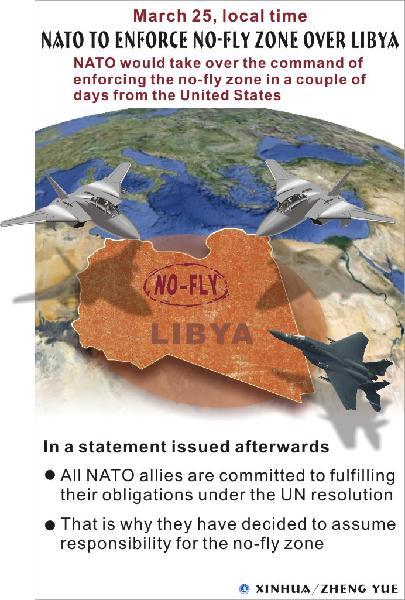 |
| Graphic shows that NATO has formed a consensus on enforcing a no-fly zone over Libya Thursday. (Xinhua/Zheng Yue) |
BEIJING, March 25 (Xinhua) -- All the 28 NATO member states have formed a consensus on enforcing a no-fly zone over Libya, as Turkey, the only Muslim member in NATO, agreed to back the plan Thursday.
Once opposing NATO's military intervention in Libya, Turkish Foreign Minister Ahmet Davutoglu said Thursday that "All of Turkey's concerns and demands on the issue have been met."
In a statement issued afterwards, NATO Secretary General Anders Fogh Rasmussen said "All NATO allies are committed to fulfilling their obligations under the UN resolution. That is why we have decided to assume responsibility for the no-fly zone."
The UN Security Council adopted Resolution 1973 last week to impose a no-fly zone over Libya and authorized "all necessary measures," excluding ground troops, to safeguard Libyan civilians.
Rasmussen told CNN Thursday evening that the alliance would take over the command of enforcing the no-fly zone "in a couple of days" from the United States, which has been coordinating the multi-national military operation. But whether NATO will take on a "broader responsibility" is still undecided, he said.
U.S. Secretary of State Hillary Clinton said later that the United States has agreed to hand over the command of enforcing a no-fly zone over Libya to NATO.
"We are taking the next step -- we have agreed along with our NATO allies to transition command and control for the no-fly zone over Libya to NATO," Clinton said at the State Department.
Having eliminated the Libyan air defense, U.S. military officials said the campaign has moved to focusing on decimating Libyan leader Muammar Gaddafi's ground forces, with new attacks targeting fuel depots and local military installations in Tripoli, Libya's capital.
On Thursday night, explosions and anti-aircraft gunfire were again heard in east Tripoli, with at least two loud blasts in the Tajoura area.
The Libyan state television reported that both "civilian and military targets" in Tripoli and Tajoura had come under attack. Earlier, government spokesman Mussa Ibrahim said Libya's telecommunications centers and state radio station would be targeted by a new round of air strikes.
Meanwhile, Mussa said nearly 100 civilians have been killed so far in the air strikes launched by major Western powers since Saturday. He urged the United Nations to "stop any kind of action" against "civilian targets" that "affects the everyday life of the Libyan people."
UN Secretary-general Ban Ki-moon said Thursday he expects the international community to continue to work hard to avoid civilian casualties and collateral damage in Libya.
"In all my meetings, public and private, I took special care to stress that action under Resolution 1973 is governed by an over-riding objective -- to save the lives of innocent civilians," Ban said.
"Resolution 1973 also reaffirms Libya's sovereignty and territorial integrity and explicitly foreclosed any 'occupation' of Libyan territory," said Ban, who just returned from a trip to Egypt and Tunisia.
When meeting with Russian Foreign Minister Sergei Lavrov, Chinese Vice Foreign Minister Zhang Zhijun said China has always stressed the priority to protect the civilians in Libya and opposes any military actions that would cause more civilian casualties or a humanitarian disaster.
Lavrov agreed that Western forces' military operation in Libya should not overstep the framework of UN Security Council resolution, and Russia called on the West to keep restraint and protect the civilians.
Meanwhile, Li Baodong, Chinese ambassador to the UN, called upon "all parties concerned to cease fire immediately in order to avoid escalating the conflict and worsening the already tense situation in the region."
Also, European Union (EU) leaders attending a two-day summit Thursday in Brussels called on Arab countries to play a more active role in dealing with the Libyan crisis.
The European Council "emphasized the key role of Arab countries, and particularly the Arab League," in supporting UN Security Council resolutions and in finding a political solution to the Libya crisis, according to an EU statement issued late Thursday night.
Related News
Photos
More>>trade
- U.S. show of force in Asian waters a threat to China: magazine
- China repairs new wound with experience from Wenchuan, Yushu quakes
- Third Chinese naval escort taskforce holds press conference
- China's defense budget to grow 7.5% in 2010: spokesman
- China's military no threat to other countries: advisory body spokesman
market
- China reaffirms its missile interception test defensive
- China to send more relief materials to flood-hit Pakistan
- Reception held to mark 60th founding anniversary of FAO, MND
- China opposes U.S. arms sales to Taiwan: Chinese defense chief
- China's military development poses no threat: defense minister





